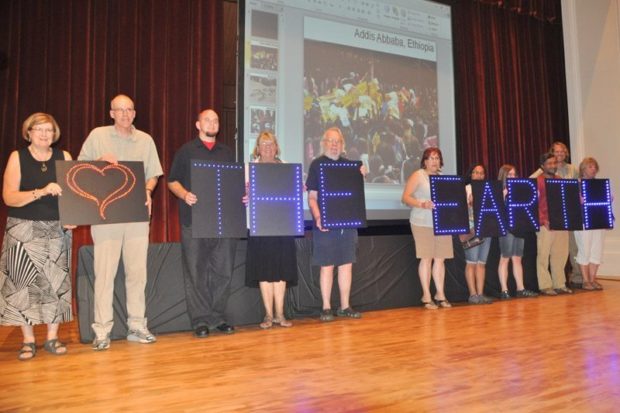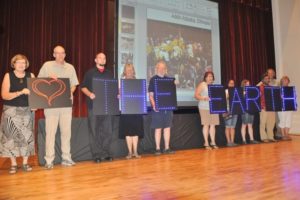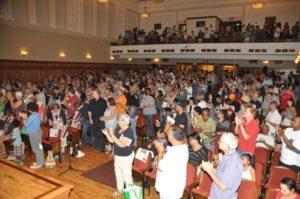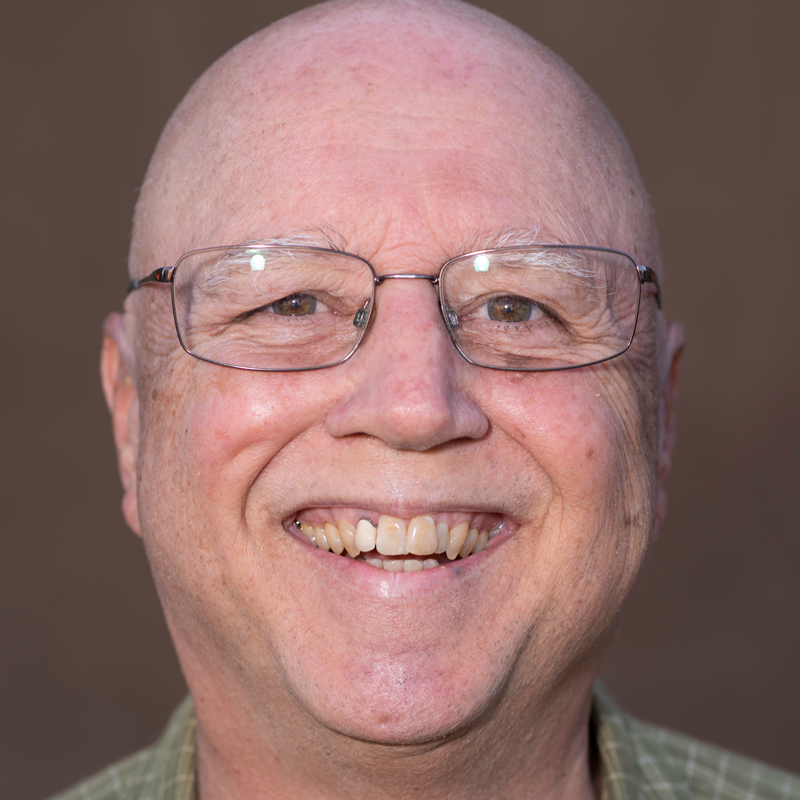
By Vic Bedoian

Bill McKibben has been touring the country to help activate more people on the issue of climate change in general and in particular to generate opposition to the proposed Keystone XL oil pipeline. He was in Fresno on Sept. 14 to talk about the importance of grassroots organizing in that effort. Before speaking to an enthusiastic standing-room-only crowd at the Fresno City College auditorium, he sat down in the plaza next door for an interview. Remarkably, even though global warming and its multifaceted and severe impacts on the Valley are not exactly an arcane subject, no other local media bothered to attend the press briefing. Only photographer Richard Iyall and I were there.
McKibben is an award-winning journalist, author and teacher at Middlebury College in Vermont. Along with a small group of concerned colleagues he jump-started 350.org, which has become the cutting-edge organization for the grassroots movement on global warming and climate change that is gaining traction the world around. They have already coordinated 15,000 rallies in 189 countries working with local groups using their Web site as the major organizing tool. In the process, he is the recipient of the 2013 Ghandi Peace Prize, the first environmental activist to do so. McKibben’s latest book is Oil and Honey focusing on the personal and global story of building and preserving a sustainable planet.
Over the past few decades, the average global temperature has risen by one degree Celsius and will go up by another degree Celsius by the end of the 21st century, even if everything is done to slow down the increase. Scientists generally agree that a rise of 3 or 4 degrees over the next hundred years will be catastrophic for civilization as we know it. That sets the stage for the changes that will occur in California and the San Joaquin Valley bioregion.
McKibben thinks California’s Central Valley is a focal point for changes caused by global warming, “As we continue this fight for climate change all over the country and all over the world places like Fresno are really important. I mean this is one of the most crucial agricultural areas in the whole world and it’s precisely the kind of place that’s most vulnerable to what it is that’s starting to happen on our planet.”
His view isn’t just that of environmental activists. McKibben cites UC Berkeley physicist and former Energy Secretary Stephen Chu as predicting what science indicates regarding the future of the Valley’s dominant industry, “You know it’s interesting Stephen Chu, the former Energy Secretary in the Obama Administration, the first speech he did when he took over as Nobel Prize physicist was to a group in California of businessmen. He said, ‘I don’t think you guys have looked carefully enough at the computer models. By the end of the century there’s no snowpack left in the Sierras, I don’t see how you guys are going to do agriculture and I don’t really get how we’re going to support the big cities either.’ Now I think somebody higher up in the administration shut him up after that because he or nobody ever spoke that bluntly again, but I think he’s right.”

Researchers at UC Merced are sounding the alarm as well. Roger Bales is an engineering professor who heads the Sierra Nevada Research Institute. They study the Sierra snowpack and other indicators of the warming planet and its regional impacts. He says the future of agriculture will be directly affected, “Some crops need cold nighttime temperatures in order to germinate. So there will need to some shifts to different crops or different varieties if we’re going to sustain production there. Then there’s also the potential for water stress. These changes that we are expecting in the Sierra Nevadas could mean that less water is available, they will mean that water is available at different times of year so there may be a mismatch between water availability and water demand for agriculture.”
McKibben adds that global warming won’t just impact the productivity of crops in the Valley and elsewhere, “The National Atmospheric and Oceanic Administration published a study in January of this year showing we’ve already gotten hot enough; the ability of humans to work outdoors has been cut about 10% and that by mid-century it will be 30%. I mean we’re getting pretty basic when we get to that, you know, too hot in the middle of the day to go out and work on your farm. What does that tell you?”
Bales and other scientists are looking at the means agriculture and government agencies will have utilize in order to adapt to the new, and warmer, reality, “There’s no silver bullet. We need to make use of groundwater storage, we need to make use of forest management—upstream management of our watersheds that’s a big issue that we’ve also neglected over the past 50 to a hundred years—and bring in a more scientifically based forest management and watershed management strategy.”
Turning to another major local concern, Central and Southern California could now be poised on the verge of a potential petroleum boom in the Monterey Shale. McKibben maintains that will only complicate the situation, “The idea that natural gas if we could frack for it is better than coal just turns out not to be true. You’re reconnecting it in the atmosphere. As for fracking for oil, some of which may happen in California, the last thing we need is more oil. Where we have carbon, we have to keep that carbon in the ground. That’s what the math shows at this point, and there’s really no two ways around it.”
Roger Bales agrees. He says in order to start reducing the rise in atmospheric gases, which are now at prehistorically high levels, public policy needs to change soon, “I was just talking to the owner of a company that does solar energy for industry as well as for homes, and he was lamenting about incentives for the fossil fuel industry versus his industry that are out there. So I think we need to reexamine those priorities collectively because we’ve got good businesspeople who will bring things like that to the fore immediately once the economy allows them. If we’re going to apply government subsidies and societal costs, we need to examine whether the opportunities, not just jump on the loudest bandwagon from a certain industry.”

Bales predicts the regional impacts of global warming will also increase the potential for super-storms that have struck other regions of the nation. “With a warmer ocean you just get more activity, you get more storms and the same thing can happen out here in the Pacific. So we have to expect to live with that and we need more resiliency in our infrastructure in order to do that. Projections are that if we have storms like have hit New York or New Orleans in the Bay Delta area, it would cause far more economic devastation.”
The rim fire in Stanislaus National Forest and Yosemite National Park underscores another looming phenomenon. Over the past century, forests have become more dense and rich in biomass. Comparative photographs of specific areas taken in the early 20th century and again several decades later show this with certainty. Bales says that forest biomass has doubled over that time making for the kind of burn conditions that have resulted in the kind of high-intensity wildfires that have created the rim fire, as well as many other fires in the western United States. Those same greening conditions, Bales conclude, at the same time use up more moisture and reduce the water available for downstream water users.
Despite the desperate attempt by climate change deniers to stuff all the public concern into a black box, McKibben points to evidence that the movement is gaining an increasing foothold on everyday Americans. Citing a recent Yale University poll, McKibben says, “between 12% and 13% of Americans say they are now willing to commit civil disobedience to slow global warming. If that’s true, or anything close to true, then we’re getting near a kind of tipping point. We just need people to actually stand up and join in this movement, and 350.org is set up to make that really easy to do.”
Bringing the issue back around to the XL pipeline, McKibben says the political heat will now be directed at President Obama by oil companies and citizen activists alike, “Like all politicians, his decision will come down to how much pain he feels from which side. The fossil fuel companies have all the money on earth, so if it’s just a question of that then they’ll win. But there are other currencies we can work in, you know, passion, spirit, creativity, sometimes people willing to spend their bodies and go to jail, so I don’t think the battle is over yet.”
In the event that the President does green-light the Keystone XL pipeline project, McKibben says a large number of people are already fully committed to the fight, “I think 75,000 people now have signed up to commit civil disobedience in the wake of that. This is the iconic environmental battle of our time so we’ll see how it goes.”
*****
Vic Bedoian is an independent journalist covering Central California ecological and environmental justice issues for Pacifica Evening News, Free Speech Radio News and the Community Alliance newspaper.

